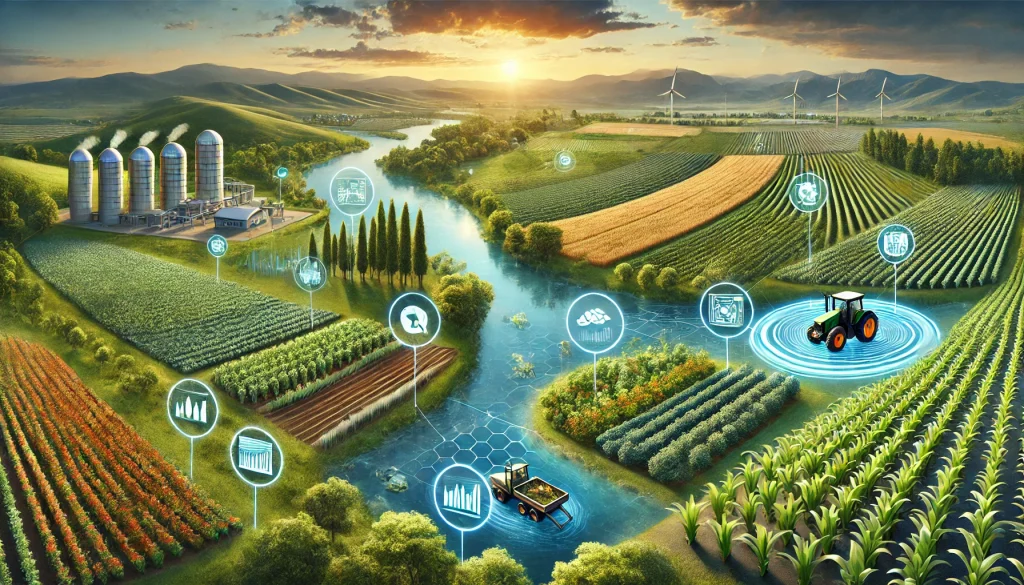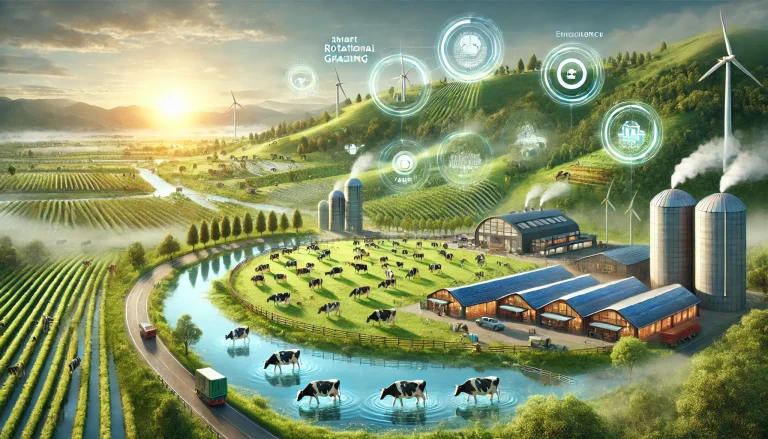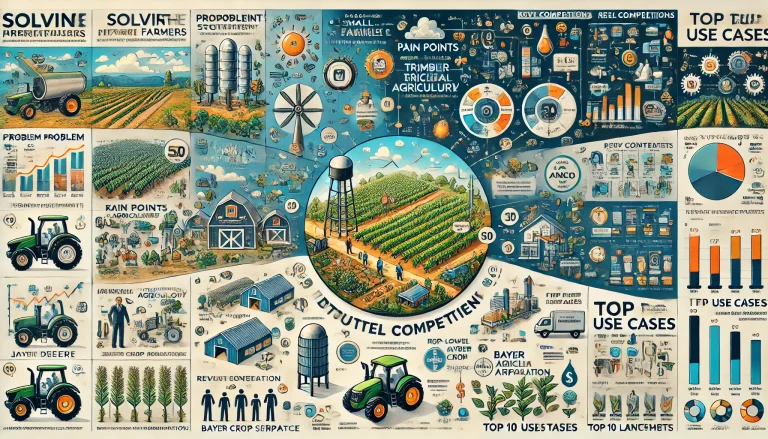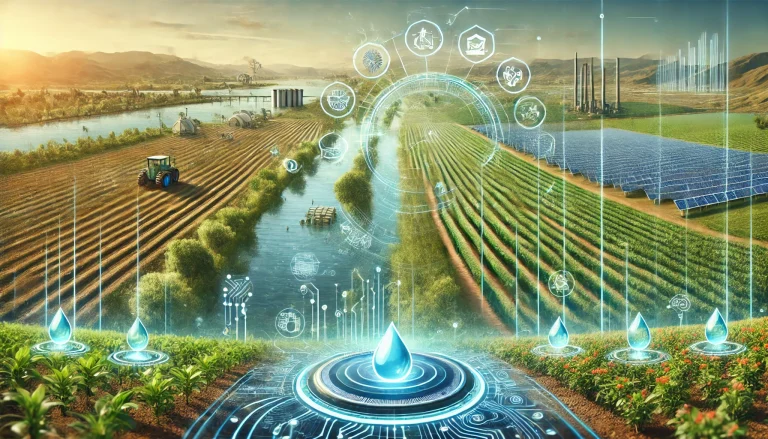Problem Statement:
Agricultural activities, while essential for feeding the global population, are a significant source of environmental pollution. The widespread use of synthetic fertilizers, pesticides, and herbicides in modern farming has led to the contamination of water bodies, air, and soil. Runoff from agricultural fields, rich in nutrients like nitrogen and phosphorus, often flows into rivers, lakes, and coastal waters, leading to eutrophication—a process that depletes oxygen in water and creates dead zones where aquatic life cannot survive. These dead zones disrupt ecosystems, harm fisheries, and threaten biodiversity. Additionally, the overapplication of synthetic chemicals in farming contributes to soil degradation, reducing its fertility over time and leading to the accumulation of harmful substances that can persist in the environment for years. The use of these chemicals also affects air quality, releasing volatile organic compounds (VOCs) and particulate matter that contribute to air pollution and pose health risks to humans and wildlife. Furthermore, the contamination of food with pesticide residues raises concerns about long-term health impacts on consumers, including potential links to cancer, endocrine disruption, and other chronic conditions. As the global demand for food continues to rise, it is crucial to address the environmental and health consequences of agricultural pollution. Developing sustainable farming practices and reducing reliance on synthetic chemicals are essential steps toward protecting the environment, preserving biodiversity, and ensuring a safe and healthy food supply for future generations.
Pain Points:
- Water Pollution from Runoff: Fertilizers and pesticides contaminate water bodies, leading to eutrophication and dead zones.
- Soil Degradation: Overuse of synthetic chemicals depletes soil fertility and leads to the accumulation of harmful substances.
- Air Pollution: Agricultural activities release VOCs and particulate matter, contributing to poor air quality.
- Biodiversity Loss: The use of synthetic chemicals disrupts ecosystems and harms non-target species, reducing biodiversity.
- Health Risks to Humans: Pesticide residues in food can pose long-term health risks, including cancer and endocrine disruption.
- Impact on Aquatic Life: Runoff causes oxygen depletion in water bodies, leading to the death of fish and other aquatic organisms.
- Dependence on Synthetic Inputs: Farmers rely heavily on synthetic fertilizers and pesticides, which can lead to resistance in pests and diseases.
- Economic Costs of Pollution: The environmental damage caused by agricultural pollution can lead to significant economic losses in fisheries, tourism, and public health.
- Climate Change Contribution: Agriculture is a major source of greenhouse gas emissions, contributing to global warming.
- Regulatory Challenges: Ensuring compliance with environmental regulations and promoting sustainable practices can be difficult in the agricultural sector.

Future Vision:
The future of agriculture lies in adopting sustainable practices that minimize environmental pollution and promote the health of ecosystems, humans, and wildlife. This vision includes the development of a digital platform that helps farmers transition to cleaner, more sustainable farming methods. The platform would offer tools and resources to reduce the reliance on synthetic chemicals, promote organic farming practices, and implement integrated pest management (IPM) strategies. By leveraging precision agriculture technologies, the platform would enable farmers to apply fertilizers and pesticides more efficiently, minimizing runoff and reducing pollution. The platform would also support the adoption of regenerative agriculture practices, such as cover cropping, crop rotation, and no-till farming, which enhance soil health and reduce the need for chemical inputs. Additionally, the platform would provide access to real-time data on soil health, water quality, and air quality, allowing farmers to monitor and mitigate the environmental impact of their activities. Partnerships with environmental organizations, research institutions, and government agencies would ensure the dissemination of best practices and the development of policies that support sustainable agriculture. By fostering a culture of environmental stewardship in farming, the platform would contribute to the creation of a cleaner, healthier environment, while ensuring the long-term sustainability of food production.
Use Cases:
- Precision Fertilizer Application: Farmers use the platform to apply fertilizers more efficiently, reducing runoff and water pollution.
- Integrated Pest Management (IPM): The platform offers tools for implementing IPM strategies, reducing the need for synthetic pesticides.
- Soil Health Monitoring: Farmers monitor soil health in real-time, adjusting practices to maintain fertility and reduce chemical use.
- Water Quality Tracking: The platform provides data on water quality, helping farmers identify and mitigate sources of pollution.
- Organic Farming Support: Farmers access resources and training on transitioning to organic farming practices.
- Regenerative Agriculture Practices: The platform promotes cover cropping, crop rotation, and no-till farming to enhance soil health and reduce chemical inputs.
- Biodiversity Enhancement: The platform offers guidance on practices that support biodiversity, such as planting pollinator-friendly crops.
- Greenhouse Gas Monitoring: Farmers track and reduce greenhouse gas emissions from their operations, contributing to climate change mitigation.
- Compliance with Environmental Regulations: The platform helps farmers stay compliant with environmental regulations and access incentives for sustainable practices.
- Community Engagement: Farmers engage with local communities to promote awareness of sustainable farming practices and their environmental benefits.
Target Users and Stakeholders:
Target Users:
- Farmers seeking to reduce their environmental impact and adopt sustainable practices.
- Agricultural cooperatives and organizations promoting sustainable farming methods.
- Agribusinesses interested in minimizing pollution and enhancing environmental stewardship.
Stakeholders:
- Environmental organizations focused on water, air, and soil quality protection.
- Government agencies regulating agriculture and environmental protection.
- NGOs working on sustainable agriculture, biodiversity conservation, and public health.
- Technology companies developing precision agriculture tools and environmental monitoring systems.
- Consumers interested in supporting environmentally friendly and sustainable food production.
Key Competition:
- Indigo Ag: Focuses on microbial seed treatments, crop diversification, and carbon sequestration to improve soil health and reduce environmental impact.
- Farmers Business Network (FBN): Provides data-driven insights and tools to help farmers optimize their practices and reduce chemical use.
- AgroSustain: Develops natural, plant-based solutions for crop protection, reducing the need for synthetic pesticides.
- Trace Genomics: Offers soil health data and traceability solutions to ensure sustainable farming practices are used.
- Regrow: Focuses on regenerative agriculture practices, providing tools and resources for improving soil health and sustainability.
Products/Services:
- Precision Agriculture Tools: Technologies that enable efficient fertilizer and pesticide application, reducing runoff and pollution.
- Integrated Pest Management Solutions: Products and services that support the adoption of IPM techniques to reduce chemical use.
- Soil and Water Quality Monitoring: Tools and services for tracking soil health, water quality, and the impact of farming practices on the environment.
- Organic Farming Resources: Training and support for farmers transitioning to organic practices, reducing reliance on synthetic chemicals.
- Regenerative Agriculture Support: Tools and resources for implementing regenerative practices that enhance soil health and reduce environmental impact.
- Greenhouse Gas Monitoring Systems: Technologies for measuring and reducing greenhouse gas emissions from agricultural activities.
- Biodiversity Enhancement Services: Consulting and tools for increasing and maintaining biodiversity on farms.
- Environmental Compliance Tools: Platforms that help farmers stay compliant with environmental regulations and access sustainability incentives.
- Community Engagement Platforms: Tools for farmers to engage with local communities and promote sustainable farming practices.
- Sustainable Marketplaces: Platforms that connect farmers with buyers interested in sustainably produced and environmentally friendly food.
Active Startups:
- AgroSustain: Develops natural crop protection solutions that reduce the need for synthetic pesticides and promote sustainability.
- Trace Genomics: Provides soil health data and traceability solutions to support sustainable farming practices.
- Regrow: Focuses on regenerative agriculture practices, offering tools and resources to improve soil health and reduce environmental impact.
- Soil Capital: Provides financial and technical support for farmers transitioning to regenerative agriculture and sustainable practices.
- AgBiome: Uses microbiome research to develop biological solutions for crop protection, reducing the reliance on chemical inputs.
Ongoing Work in Related Areas:
- Research on natural pest control methods that reduce the need for synthetic pesticides in agriculture.
- Development of precision agriculture technologies that optimize the application of fertilizers and pesticides, minimizing environmental impact.
- Soil restoration projects focused on rebuilding soil organic matter and fertility in degraded agricultural lands.
- Biodiversity enhancement programs that support the reintroduction of diverse plant and animal species into farming systems.
- Climate-smart agriculture initiatives that promote practices reducing greenhouse gas emissions and increasing carbon sequestration in farming.
Recent Investment:
- $200 million investment in Indigo Ag in 2023 to expand their work on sustainable agriculture and environmental stewardship.
- $150 million raised by Regrow in 2022 to scale their regenerative agriculture platform and reach more farmers globally.
- $100 million in funding for AgroSustain in 2023 to develop and distribute their natural crop protection solutions.
- $75 million in venture capital for Trace Genomics in 2024 to enhance their soil health and traceability solutions.
- $50 million invested in Soil Capital in 2023 to support farmers transitioning to sustainable and regenerative practices.
Market Maturity:
The market for sustainable agriculture practices that minimize pollution is gaining momentum as awareness of the environmental and health risks of agricultural pollution grows. Farmers, agribusinesses, and consumers are increasingly recognizing the importance of reducing reliance on synthetic chemicals, protecting water quality, and enhancing biodiversity. Investments in precision agriculture, regenerative practices, and natural crop protection solutions are rising, driven by the need to build resilience against environmental degradation and climate change. Governments and international organizations are also playing a key role in promoting sustainable
practices through grants, subsidies, and regulatory support. While challenges remain in scaling these practices and reaching all farmers, particularly in regions where synthetic inputs are heavily relied upon, the market is steadily maturing. As more farmers adopt environmentally friendly and sustainable practices, the agricultural sector will become more resilient, environmentally responsible, and capable of meeting the challenges of the future.
Summary:
Agricultural activities are a major source of environmental pollution, with the use of synthetic fertilizers, pesticides, and herbicides contributing to the contamination of water bodies, air, and soil. This pollution has serious consequences for ecosystems, biodiversity, and human health, making it essential to reduce the environmental impact of farming practices. A digital platform designed to promote sustainable agriculture could help farmers transition to cleaner, more environmentally friendly practices, reducing their reliance on synthetic chemicals and minimizing pollution. By providing tools for precision agriculture, integrated pest management, and regenerative practices, the platform would empower farmers to protect the environment while maintaining productivity. As the market for sustainable agriculture continues to mature, driven by increased investment and support, there is a significant opportunity to transform the agricultural landscape, ensuring a cleaner, healthier environment for future generations.



